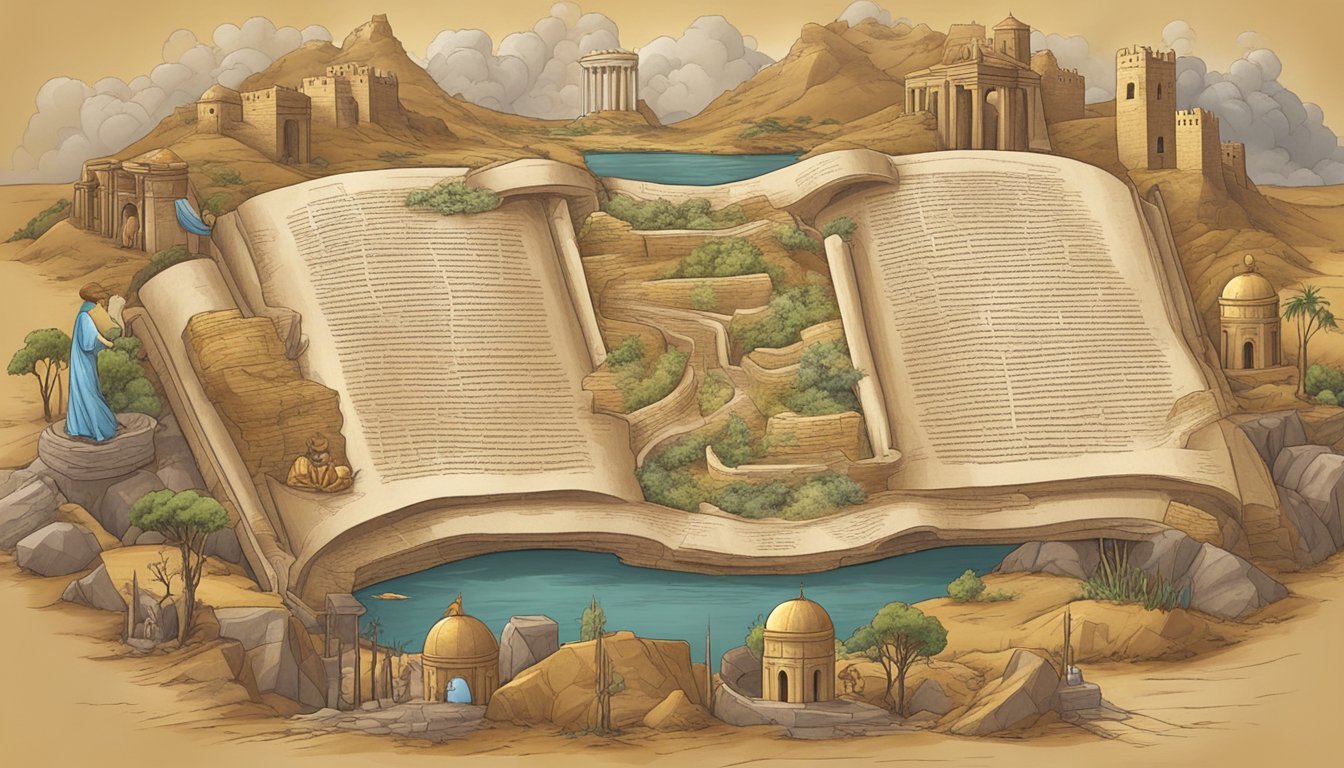The Impact of 'Testament' on Other Biblical Adaptations in Development
Shaping the Future of Faith-Based Entertainment
The television series 'Testament' has set a new standard for biblical adaptations, influencing how future projects approach religious narratives on screen. By integrating scholarly input and midrashic interpretations, the show offers a more nuanced portrayal of Moses and the Exodus story. This approach has prompted other filmmakers and television producers to reconsider their methods when adapting biblical texts, emphasizing historical accuracy and cultural context.
'Testament' employs advanced visual effects to bring the dramatic elements of the Exodus to life, captivating audiences while maintaining a sense of authenticity. This balance between spectacle and substance has raised viewer expectations for biblical adaptations. As a result, other projects in development are now exploring ways to incorporate both compelling visuals and deeper scriptural insights.
The series' impact extends beyond entertainment, potentially enhancing biblical literacy among viewers. By presenting a well-researched and visually engaging narrative, 'Testament' has demonstrated the educational potential of religious adaptations. This has encouraged other filmmakers to consider the broader cultural and educational implications of their work when bringing ancient texts to modern screens.
Historical Context of 'Testament'
'Testament' draws inspiration from the Exodus narrative in the Old Testament. This biblical account describes the liberation of the Israelites from slavery in ancient Egypt.
The series is set against the backdrop of the Ancient Near East, particularly Egypt during the time of the pharaohs. It explores the cultural and societal norms of this period, providing viewers with a glimpse into the world of the Hebrews and Egyptians.
'Testament' incorporates elements from Judeo-Christian traditions and Abrahamic religions. It portrays key biblical events such as the plagues, the parting of the Red Sea, and the receiving of the Ten Commandments.
The show's creators have made efforts to balance historical accuracy with dramatic storytelling. They consulted scholars and religious texts to ensure a nuanced portrayal of the time period and its customs.
By delving into the cultural context of the Exodus story, 'Testament' offers viewers a more comprehensive understanding of the biblical narrative. It explores the social, political, and religious dynamics that shaped the events described in the Old Testament.
The series also examines the broader implications of the Exodus story within the context of Abrahamic religions. It highlights themes of faith, leadership, and divine intervention that resonate across various belief systems.
Literary Analysis of 'Testament'
'Testament' employs innovative narrative techniques and character development to reimagine biblical stories. The series blends canonical texts with creative interpretations, offering fresh perspectives on familiar narratives.
Narrative Technique and Thematic Development
'Testament' utilizes a non-linear storytelling approach, weaving together multiple timelines and perspectives. This technique allows for a deeper exploration of characters' motivations and the consequences of their actions. The series incorporates flashbacks and flash-forwards, creating a rich tapestry of interconnected events.
Thematically, 'Testament' explores concepts of faith, morality, and human nature. It delves into the complexities of leadership and the burden of divine calling. The narrative often juxtaposes moments of doubt with instances of profound spiritual revelation.
Biblical accuracy is balanced with creative storytelling. The show's writers draw from midrashic traditions to fill narrative gaps, providing plausible explanations for unexplored aspects of biblical accounts.
Comparison with Canonical Texts
'Testament' adheres closely to biblical narratives while expanding on character backgrounds and motivations. It maintains the core events and messages of scripture but adds depth through fictional dialogues and scenarios.
The series incorporates elements from various biblical books, creating a cohesive narrative that spans multiple generations. This approach allows for a more comprehensive exploration of biblical themes and interconnections between different stories.
'Testament' also draws inspiration from extra-biblical sources, including historical and archaeological records. This integration of scholarly input enhances the show's authenticity and educational value.
Character and Plot Interpretations
Character development in 'Testament' is a standout feature. Biblical figures are portrayed as multidimensional individuals with complex emotions and motivations. The series explores their internal struggles, relationships, and personal growth.
Moses, for example, is depicted not just as a powerful leader but as a man grappling with self-doubt and the weight of his responsibilities. Supporting characters receive similar treatment, with expanded roles that provide new insights into familiar stories.
Plot interpretations in 'Testament' often focus on the human elements of biblical narratives. The series explores the psychological and emotional impact of divine interventions on characters. It also examines the societal and cultural contexts in which these stories unfold.
Theological Implications
The portrayal of biblical narratives in media like "Testament" raises important questions about interpretation and representation of sacred texts. It prompts reflection on how adaptations shape religious understanding and practice.
Religious Interpretation
"Testament" incorporates elements from Jewish midrash and scholarly input, offering a nuanced portrayal of Moses. This approach highlights the interplay between scriptural text and interpretive tradition. It demonstrates how adaptations can bridge ancient stories with contemporary perspectives.
The series prompts viewers to consider multiple layers of meaning in biblical accounts. By presenting familiar stories in new ways, it encourages fresh engagement with Scripture. This can lead to deeper theological discussions about the nature of revelation and divine communication.
"Testament" also showcases the complexity of biblical characters, moving beyond simplistic portrayals. This nuanced approach aligns with modern theological trends that emphasize the humanity of biblical figures.
Influence on Modern Faith and Practice
Biblical adaptations like "Testament" can significantly impact how people understand and live out their faith. They often make ancient stories more relatable to modern audiences. This accessibility can spark renewed interest in Scripture and religious tradition.
These portrayals may influence personal spirituality and congregational practices. For example, a compelling depiction of prayer or worship in a series might inspire viewers to adopt similar practices. Adaptations can also highlight ethical teachings from Scripture, potentially shaping moral decision-making.
However, there's a risk of conflating dramatic interpretations with authoritative teachings. Religious leaders and educators face the challenge of guiding their communities in discerning between artistic license and doctrinal truth.
Discussion on Sacred Texts
"Testament" and similar adaptations spark conversations about the nature and interpretation of sacred texts. They raise questions about literal versus allegorical readings of Scripture. This can lead to deeper exploration of hermeneutical approaches within faith communities.
These adaptations often incorporate extra-biblical sources, like midrash in Jewish tradition. This practice highlights the rich interpretive history surrounding sacred texts. It can encourage viewers to engage with a broader range of religious literature and commentary.
Adaptations may also prompt discussions about canon formation and the authority of different texts. They can draw attention to lesser-known stories or alternative versions of familiar narratives. This broader perspective can enrich understanding of religious traditions and their development over time.
Reception and Critique
'Testament' has sparked diverse reactions from scholars, critics, and audiences. Its approach to Biblical storytelling has influenced discussions on adapting sacred texts for modern media.
Scholarly Insights and Public Reaction
Religious scholars have examined 'Testament' for its historical accuracy and adherence to scriptural details. The series' integration of midrash and scholarly input has garnered praise for creating a nuanced portrayal of Moses. This approach has set a new standard for Biblical adaptations.
Critics have evaluated the balance between spectacle and character development. The show's use of visual effects to depict the Exodus story has been a focal point of discussion. Some viewers appreciate the innovative portrayal of Biblical themes and figures.
Public reaction has varied. Many applaud the series for its educational impact, highlighting lesser-known aspects of Moses' leadership. Others debate its interpretation of social justice themes within the Biblical narrative.
Rhetorical Criticism and Reception History
Rhetorical analysis of 'Testament' has focused on its narrative techniques and persuasive elements. Scholars have examined how the series frames Biblical stories to resonate with contemporary audiences.
The show's reception history reveals shifting attitudes toward Biblical adaptations. It has influenced discussions on the role of media in interpreting sacred texts. Some argue it has opened new avenues for exploring social justice movements through a Biblical lens.
'Testament' has also sparked debates on the representation of Biblical figures in popular culture. Its impact extends to other adaptations in development, setting new expectations for depth and authenticity in portraying ancient narratives.
Influence on Religious Education
The Old Testament plays a crucial role in religious education across various faiths. It serves as a foundational text for understanding the historical and spiritual roots of many belief systems.
In theological seminaries, the study of Testament narratives forms a core part of curriculum development. Students analyze these ancient texts to gain insights into moral teachings and divine principles.
Biblical studies programs often use Testament stories as case studies for ethical discussions. This approach helps learners apply ancient wisdom to contemporary issues, fostering critical thinking skills.
Education departments in religious institutions frequently incorporate Testament themes into their curricula. These narratives provide rich material for teaching values, history, and cultural context to students of all ages.
The Testament's influence extends beyond formal education settings. Many religious communities use its stories in youth groups, adult study sessions, and spiritual retreats to promote personal growth and community bonding.
Biblical texts from the Testament are often adapted for different age groups in religious education. Simplified versions for children and in-depth analyses for adults ensure accessibility across various learning levels.
Religious educators often draw parallels between Testament events and modern situations. This technique helps make ancient teachings relevant to today's learners, bridging the gap between past and present.
Impact on the Creative Industry
'Testament' has sparked renewed interest in biblical adaptations across various media. Its success has influenced both visual and literary approaches to religious narratives.
Film and Television Adaptations
'Testament' has set a new standard for visual effects in biblical storytelling. Studios are investing more in high-quality CGI to bring ancient miracles to life on screen. The series' approach to character development has also inspired other productions to focus on the human aspects of biblical figures.
Streaming platforms are greenlighting more faith-based content, recognizing the market potential demonstrated by 'Testament'. This trend has led to an increase in jobs for visual effects artists, costume designers, and set decorators specializing in historical recreations.
The show's success has encouraged filmmakers to explore lesser-known biblical stories. This expansion of subject matter is diversifying the content available to viewers interested in religious narratives.
Literary and Dramatic Adaptations
'Testament' has influenced authors and playwrights to revisit biblical tales with fresh perspectives. Publishers report increased interest in retellings of Old Testament stories, particularly those focusing on supporting characters.
Theater companies are experimenting with immersive productions that bring biblical scenes to life, inspired by the visual storytelling techniques used in 'Testament'. These adaptations often incorporate modern technology to create engaging experiences for audiences.
The series has also sparked debates among scholars and creatives about the balance between historical accuracy and artistic license in religious adaptations. This discourse is shaping how new projects approach the creative process when adapting sacred texts.
Cultural Resonance and Societal Impact
'Testament' has sparked conversations about representation in biblical adaptations and inspired viewers to apply ancient wisdom to modern issues. Its influence extends beyond entertainment, shaping cultural perceptions and social movements.
Representation and Inclusion within Adaptations
'Testament' sets a new standard for diversity in biblical storytelling. The series features a multicultural cast, reflecting the historical diversity of the ancient Near East. This approach challenges traditional depictions and resonates with modern audiences seeking broader representation.
Casting choices in 'Testament' have prompted other productions to reconsider their approach to biblical figures. Producers are now more likely to cast actors from various ethnic backgrounds in key roles.
The show's success has encouraged networks to greenlight projects that explore lesser-known biblical stories, particularly those centered on women and marginalized groups. This trend expands the range of narratives available to viewers.
Role of Adaptations in Social Movements
'Testament' has become a touchstone for discussions on social justice. The series draws parallels between ancient struggles and contemporary issues, inspiring viewers to engage with social causes.
Religious and secular groups alike use themes from the show to frame conversations about equality, freedom, and human rights. Scenes depicting the Exodus have been particularly impactful, resonating with modern liberation movements.
The show's portrayal of moral dilemmas has prompted viewers to examine their own ethical frameworks. This introspection has led to increased engagement with faith-based and secular social justice initiatives.
'Testament' has also influenced how religious institutions approach outreach. Many have incorporated elements from the series into their educational programs, making biblical stories more accessible to younger generations.
Future Prospects for Biblical Adaptations
Biblical adaptations are entering a new era of creativity and audience engagement. The success of recent series has paved the way for innovative approaches in storytelling and production techniques.
Emerging Trends in Narrative and Production
Visual representation in biblical adaptations is evolving rapidly. Producers are embracing cutting-edge CGI to bring ancient miracles and epic events to life with unprecedented realism. This trend is likely to continue, pushing the boundaries of what's possible in depicting biblical narratives.
Creative license in storytelling is becoming more accepted. Adaptations are exploring lesser-known biblical characters and events, offering fresh perspectives on familiar stories. This approach appeals to both religious and secular audiences, broadening the appeal of biblical content.
Authenticity in costumes and locations remains a priority. Production teams are investing heavily in historical research to ensure accuracy, creating immersive viewing experiences that transport audiences to ancient times.
Predictions for 'Testament' Influences
'Testament' is set to influence future biblical adaptations significantly. Its focus on the human aspects of biblical figures may inspire other productions to delve deeper into character development and relatable storylines.
The series' approach to portraying miracles and divine interventions could become a template for balancing faith elements with mainstream appeal. This balance is crucial for attracting diverse audiences while maintaining the essence of biblical narratives.
'Testament' may also spark interest in adapting more complex or controversial biblical stories. Its success could encourage producers to tackle challenging narratives that were previously considered too risky for mainstream adaptation.






